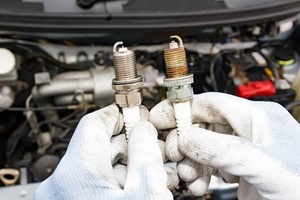Understanding Lean vs Rich Fuel Mixture in Cars

In the intricate world of internal combustion engines, the air-fuel ratio plays a crucial role in determining performance, emissions, and overall efficiency. Whether an engine operates on a lean or rich fuel mixture can significantly impact its behavior and longevity. Let's delve deeper into the differences between these two mixtures and their effects on automotive performance.
What is a lean fuel mixture?
When an engine runs on a lean fuel mixture, it means that there is an excess of air relative to fuel in the combustion chamber. This lean condition is typically characterized by a higher air-to-fuel ratio, often exceeding the stoichiometric ratio of 14.7:1 for gasoline engines. While a lean mixture offers benefits such as reduced emissions and improved fuel economy, it also comes with its own set of challenges.
What are the effects of a lean fuel mixture on your engine?
One of the primary concerns with a lean fuel mixture is its potential to cause engine overheating and reduced power output. With less fuel available to absorb and dissipate heat, combustion temperatures can soar, leading to premature wear and potential engine damage. Additionally, a lean mixture may result in rough idling, engine knocking, and even backfiring, all of which can adversely affect engine performance and longevity.
What is a rich fuel mixture?
Conversely, a rich fuel mixture contains an excess of fuel compared to air in the combustion chamber. This rich condition often results in a lower air-to-fuel ratio, with more fuel available for combustion. While a rich mixture can provide enhanced engine cooling and smoother operation, it also has its drawbacks.
What are the effects of a rich fuel mixture on your engine?
One of the notable consequences of a rich fuel mixture is increased fuel consumption and emissions. With an abundance of fuel present, the engine may struggle to burn it efficiently, leading to wasted fuel and higher levels of pollutants in the exhaust. Additionally, a rich mixture can lead to power loss, foul-smelling exhaust emissions, and black smoke from the tailpipe, indicating incomplete combustion.
What causes an engine to run lean or rich?
Maintaining the stoichiometric mixture is crucial for efficient performance in a gasoline engine. However, several factors can disrupt the balance:
Lean Running
- Vacuum leaks: When there’s a leak in the vacuum system, it lets excess air into the engine. This excess air can cause stalling and poor performance.
- Clogged fuel filter: With time, dirt and debris will begin clogging the fuel filter, interrupting fuel delivery. If left unchecked, it can limit the available fuel. Additionally, a blocked air filter could throw off the AF ratio.
- Weak fuel pump: A faulty fuel pump can reduce fuel pressure, affecting fuel delivery. If the fuel pressure drops too far, it can reduce the flow rate in the fuel injectors, creating a lean condition. In older vehicles with carburetors, a lean condition can be caused by blocked jets.
Rich Running
- Faulty sensors: The oxygen sensor, mass airflow sensor, and coolant temperature sensor play vital roles in helping the Engine Control Unit determine the correct fuel amount. If any of these sensors send inaccurate information, it can lead to rich mixtures in the engine.
- Fuel pressure regulator issues: The primary responsibility of the fuel pressure regulator is to maintain consistent pressure for the fuel injectors to operate. Issues with the regulator can flood the engine with fuel, leading to a rich condition.
- Defective intake temperature sensor: The intake sensor lets the engine’s computer know the temperature of the outside air entering the engine. If this is defective, it can create rich mixtures in the engine.
In conclusion, understanding the differences between lean and rich fuel mixtures is essential for maintaining optimal engine performance and efficiency. By considering factors such as engine design, operating conditions, and fuel quality, automotive engineers can fine-tune air-fuel ratios to meet the diverse needs of modern vehicles while minimizing their environmental footprint. With this knowledge in hand, driver like you can make informed decisions about their vehicles' maintenance, fueling habits, and overall performance, ensuring a smooth and enjoyable driving experience for years to come.